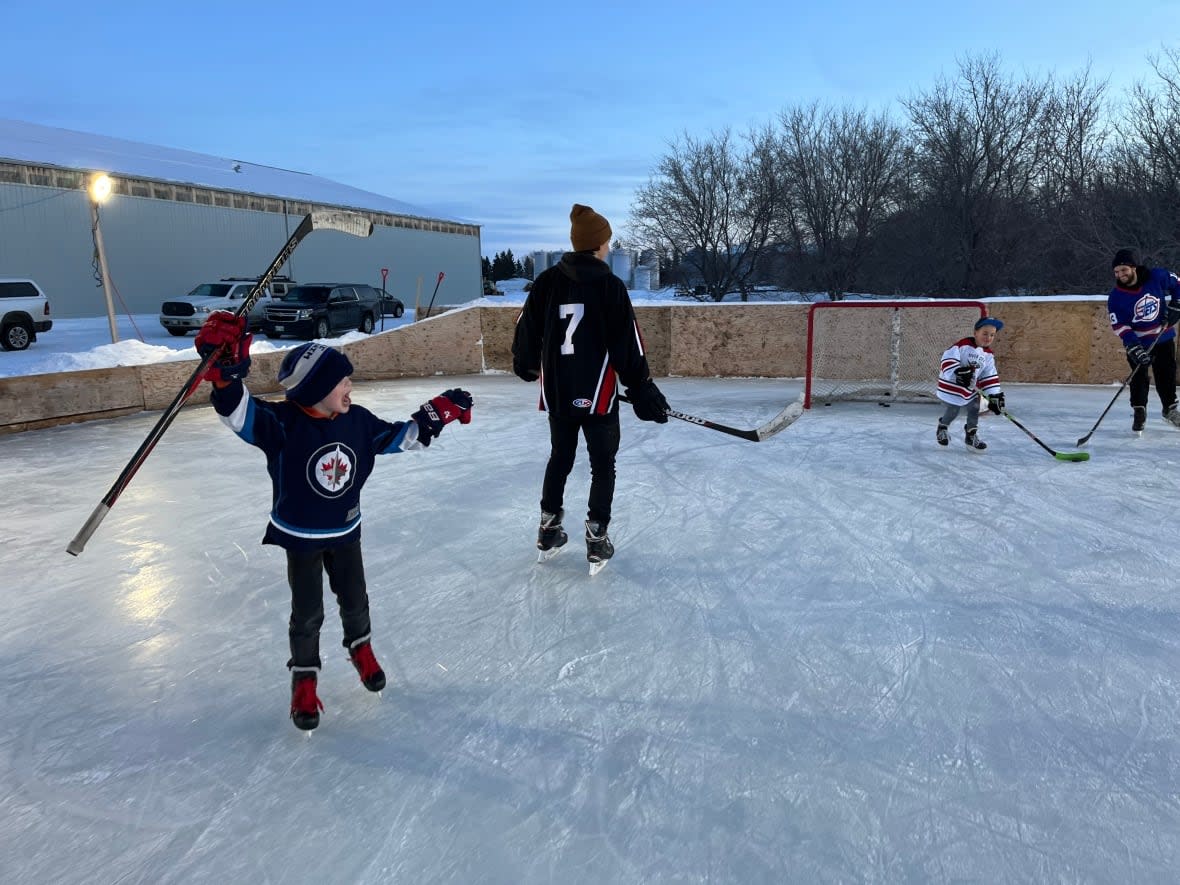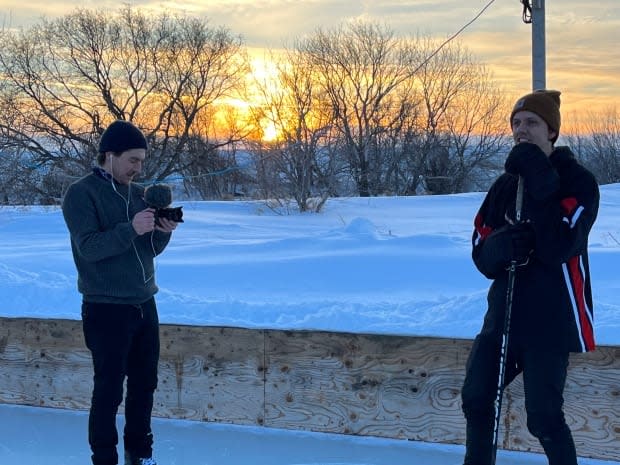Filmmaker dodges pucks for intimate look at Canada's winter tradition

With skates on his feet, a camera in his hands, and a half dozen kids speeding up and down a country rink at dusk — Randy Frykas has just the scene he's looking for.
"It's like, what could you ask for? You got the sun going down, you got a fresh sheet of ice and a bunch of pucks and all your good friends," he said, looking through his lens on a farm near MacGregor, Man.
The kids are racing around, calling for passes. Some shots get blasted into the net; others fly over the puck-marked plywood boards, likely lost in the surrounding snowbanks until spring.
As he dodges pucks and sticks, trying to get the perfect shot, the Winnipeg-based filmmaker calls this the ideal scenario for storytelling in his documentary series on some of Canada's best outdoor rinks.
On the ice, Darryl Wiebe is playing with his kids and a few nieces and nephews.
"I just wanted something available for everybody because not everybody partakes in the community sports in town," Wiebe explained during a break in play.

Wiebe and his brothers built this rink in the back of their family's Beaver Creek Farms, open to family, friends and neighbours.
About a third the size of a standard hockey rink, complete with boards, LED lights and a warming shack, the rink is a little frozen oasis in the middle of seemingly endless farmland.
"A couple other local guys that have been coming here, they just text me and say if the ice needs to be flooded or no cups in the shack for coffee," he said, watching the kids skate.
"I'm like, well, that's how it goes.

"I wanted something for that kind of stuff and for the community to have something close by instead of having to maybe pay ice times or stuff like that."
For Frykas, it's exactly the grassroots connection he's trying to celebrate as he travels the country, documenting what he calls outdoor rink culture for a series he recently launched on his Outdoor Hockey Club YouTube channel.
"It's like you do your best trying to capture it with a camera and with sound or whatever. But sometimes again you know, you gotta put your skates on for yourself and you got to go feel this."
Outdoor rink culture
This winter, the filmmaker is trying to feel it in as many places as he can.
"I want to touch on different regions of Canada, different types of rinks." he said. "A backyard rink, a community rink, a rink on a lake, a rink on a river, a rink on a farm, that sort of thing."
Four episodes in, he's hit Saskatchewan, Yukon and Manitoba, and is now racing against the looming spring to get to Ontario and the East Coast.
While the rinks and communities change, access and simplicity are emerging themes.
Rules include stockpiling firewood
In Whitehorse, at the Lorne Mountain Community Centre where the posted rules include — keep the firewood pile stocked and the warming shack door closed — he found a weekly pickup game with a group of women called the "Goon Girls."
Ashley Denisoff says she taught herself to skate during the pandemic, calling the rink a supportive place to play and socialize.
It's a similar scene in Moosomin, Sask., where Frykas found Jesse McMullen out skating with his six-year-old daughter, Hadlee, who explains she's just happy to have the time together.
"I'm like here's this, right here, that's the essence of hockey, said Frykas.
"A father and a daughter just passing the puck around, skating laps, no real agenda."
A simpler game
Back on the Wiebe farm, that pickup game is still going, the sun has set, the lights are on, the flow has slowed, and feet and hands are starting to get a little cold.
Frykas has traded his camera for a stick.
He explains it was an Instagram post about the rink build that first intrigued him.
"Most of it is just stuff from around the farm."
A lot of the materials are left over or repurposed from other projects. A tractor pulling a water tank doubles as a Zamboni.
That led to a story about family and community.

"This is a whole family of cousins and brothers and nearby friends. These are memories that you know they're all going to remember for years."
Not long ago, he wouldn't have seen himself doing this Burned-out and put off by competitive high school hockey as a teen, he only really started playing again in his 30s.
"Just some negative vibes around the game — I wish I would have kept playing in the same way that I'm playing now, just for fun on the outdoor."

As mainstream hockey struggles with rising costs, inclusion and competitive pressures, he says he feels the outdoor game is as relevant as ever, for those who just want to enjoy a simpler experience.
"You know, time disappears, there's no score clock, there's no time clock, he said, watching the sunset reflect off the ice.
"The only thing is you, the ice and your stick."


